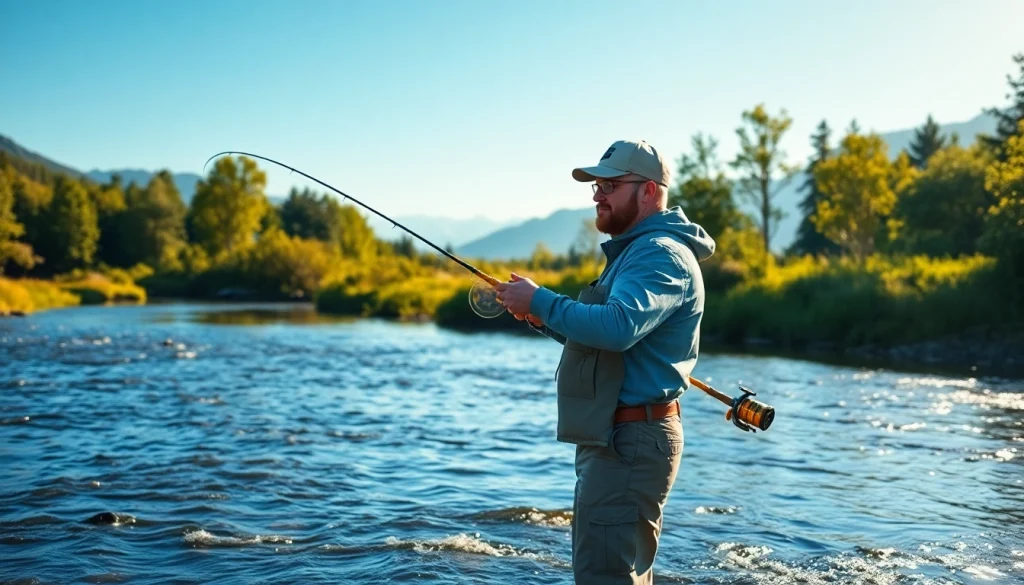Mastering the Art of Fly Fishing Lessons Near Me: A Comprehensive Guide to Local Instruction

Understanding Fly Fishing Basics
Introduction to Fly Fishing
Fly fishing is a method of angling that uses artificial flies to catch fish. This unique approach differs significantly from standard fishing techniques, relying on a specialized rod, reel, line, and flies that mimic the natural food sources of fish. For many, it’s not just about catching fish; it’s about the experience of being in nature, understanding the water, and connecting with the environment. Whether you’re drawn to fly fishing for the challenge it presents or the tranquil scenes it offers, learning how to fly fish can be an incredibly rewarding endeavor.
If you’re searching for Fly fishing lessons near me, it’s essential to familiarize yourself with some of the foundational concepts before seeking out professional instruction. This guide will delve deeper into understanding the basics of fly fishing, the equipment needed, and how to find the perfect lesson opportunities tailored for you.
Essential Equipment for Beginners
Starting with the right equipment is crucial for success in fly fishing. It allows you to better understand techniques and improve your fishing experience. The essential gear includes:
- Fly Rod: A fly rod is typically longer and more flexible than standard fishing rods, providing the necessary control to cast the lightweight fly.
- Fly Reel: This component winds the line after a catch but also holds the backing line and rod line securely.
- Fly Line: The type of line affects the casting distance and accuracy. There are floating, sinking, and intermediate lines, each suited for different water conditions and fishing strategies.
- Leader and Tippet: These connect the fly to the fly line. The leader is stronger and transparent, while the tippet is thinner, allowing for a more natural presentation of the fly.
- Flies: Various flies mimic different insects and other food sources to attract fish. Learning about dry flies, nymphs, and streamers is essential.
Common Casting Techniques
Mastering casting techniques is fundamental in fly fishing. The basics include:
- Overhead Cast: This is the most common technique, where the rod is raised above the head and then brought down to propel the fly forward.
- Roll Cast: Used in tight spaces where there’s overhead obstruction, the roll cast allows for a smooth presentation without needing much backcasting.
- Spey Cast: This advanced technique is popular in river fishing, allowing anglers to cast long distances using minimal backspace.
Finding Fly Fishing Lessons Near Me
Researching Local Experts and Guides
When looking for lessons, start by researching local experts and guides who specialize in fly fishing. Many experienced anglers and certified guides offer personalized lessons suited for all skill levels. Engaging with an expert can enhance your understanding of the local waters and species.
Utilizing Online Resources and Reviews
The internet is a valuable resource for finding fly fishing lessons. Search for online reviews and testimonials of local guides to gauge their effectiveness. Websites, social media, and dedicated fishing forums often provide insights into the best instructors, available courses, and special events. You can also check platforms that aggregate ratings and allow you to compare different options.
Evaluating Lesson Formats and Availability
Lessons can vary widely in format and duration. Some instructors offer one-on-one sessions, while others may provide group lessons, which can be a more affordable option. Consider your learning style and choose between half-day, full-day, or multi-day courses. Availability may fluctuate by season, so it’s useful to plan ahead and book early.
Benefits of Professional Fly Fishing Lessons
Personalized Instruction for Different Skill Levels
One of the biggest advantages of taking professional lessons is the tailored approach instructors provide. Whether you’re a beginner learning the basics or an experienced angler wanting to refine skills, instructors can customize lessons to meet your needs. They evaluate your current skill level, identify areas for improvement, and adapt their teaching methods accordingly.
Access to Knowledgeable Instructors
Instructors bring a wealth of experience and knowledge, which can significantly accelerate your learning curve. They understand the nuances of local waters, fish behaviors, and seasonal patterns. Access to their expertise can furnish you with insights that you might not otherwise gain from self-directed learning.
Gaining Confidence on the Water
Many beginners feel apprehensive about going out on the water. Professional lessons help build confidence and competence in your skills. As you practice casting, learn about fly selection, and engage in fishing techniques under guidance, you’ll find yourself becoming more sure of your abilities.
Key Techniques Taught in Fly Fishing Lessons
Mastering the Cast: Techniques and Tips
Effective casting is crucial to successful fly fishing. Lessons focus on mastering various casting techniques, emphasizing the importance of timing, trajectory, and alignment. Instructors will provide practical tips, such as practicing false casts, which allow you to gain control over the line before the final presentation.
Understanding Fly Selection and Presentation
Instructors teach the art of fly selection and presentation, which is vital to catching fish. Understanding which flies to use based on the current conditions and the target fish species can dramatically improve your success rate. Lessons will often include practical sessions to observe how different flies respond on the water and how to present them effectively to mimic natural prey.
Effective Strategies for Catching Fish
Catching fish goes beyond just casting your line. Instructors provide insights into effective tactics for specific environments, teaching students how to read the water, identify holding spots, and recognize fish behaviors. Through practice, you will learn about the various approaches to improve your odds of a successful catch.
Practicing Fly Fishing Safely and Responsibly
Safety Guidelines for Water Activities
Safety should always be a priority when engaging in any form of fishing. As a fly fisher, it’s essential to stay informed about water conditions, weather changes, and personal safety measures. Wearing a life jacket, following local regulations, and being mindful of your surroundings are all vital practices to uphold an enjoyable experience.
Conservation and Ethical Fishing Practices
Ethical practices in fishing contribute to preserving aquatic ecosystems. Responsible anglers respect catch limits, adhere to seasonal regulations, and practice catch-and-release techniques where applicable. Lessons often include discussions about conservation and how to contribute positively to the environment.
Resources for Continued Learning and Development
After completing lessons, many anglers seek ongoing opportunities to improve their skills. Resources for continued learning include local workshops, online tutorials, and joining fishing clubs. Engaging with the fly fishing community can also provide insights into best practices, new techniques, and opportunities to network with fellow enthusiasts.




